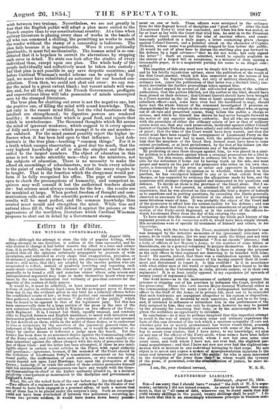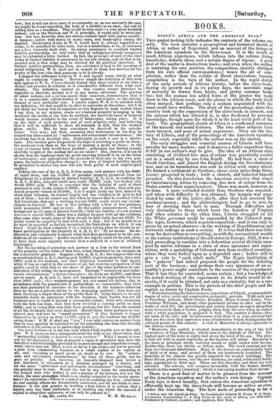PARTNERSHIP LIABILITY.
Edinburgh, August 21, 1854.
8in-1 anz sorry that I should have " evaded " the drift of W. S.'s ergs. meats; -certainly I did not intend evasion. As stated by himself, that awn. meat is, that in "all casesof debt, wherever can be found assets that will yield twenty shillings in the pound, twenty shillings shall be paid." I do not doubt that this is an- exceedingly wholesome principle in business mat- tere ; but it will not do to carry it to extremity, or, as was anciently the cane, we night be found regarding the body of a creditor as an asset, and end by selling him as a bondman. This would be very cruel—a very great hardship indeed ; yet on the Shylock and W. S. principle it would only be strict jus- tice: Our law, however, does not always content itself with justioe merely; it,tempers justice with mercy in many cases, and bankruptcy among the number. Bankruptcy is not, as W. S. would have it, always regarded as a crime, to be punished by utter ruin, but as a misfortune, to be, in instances not a few, leniently dealt with. In asking permission to establish limited liability partnerships, we only crave that an indulgence already recognized may be extended a little further. In fact, the principk of each of the chief forms of limited liability is sanctioned by our law already, and all that is de- manded now is that scope may be allowed for its practical operation. If limited liability partnerships, then, are calculated to lead to the ignoring of moral obligations, W. S. need not in respect to-them feel nervous for the purity of the law—the fatal gangrene is in it already. I suspect the difference between W. S. and myself turns chiefly on what ought to constitute "assets." However simple the definition of this term may appear to W. S., I have already hinted • that there existed at one time a theory and practice in relation, to it considerably different from what now obtains. The definition current in this country cannot therefore be regarded as absolute, neither is it by any means universal. The practice of other nations, not a jot leas moral than ourselves, demonstrates that it is to a considerable extent matter of opinion, and relative to the circum- stances of each particular case. I cannot expect W. S. to be satisfied with my definition, for that would be in effect to surrender at discretion; bat I do net think my heresy will be regarded as very flagrant by most traders when I say that, in my opinion, assent are whatever property belonging to the insolvent the trader at the time he credited, the iasolvent knew or believed would become available in the event of bankruptcy taking place. It is on the faith of -such property, and of such property only, and believing that it will be sufficient to meet all demands in full,. that the crediter gives credit. But he 'may sometimes be deceived in his calcula- tions? Very true but then, assuming that bankruptcy in the firm he trusted has been =teed by "unforeseen and unfortunate circumstances," the insolvent has been deceived also. Bankruptcy in such a case is a misfor- tune. The creditor gave hit goods in the hope of receiving a profit on them ; the insolvent took them in the hope of making a profit on them ; in the event of success both Would have profited ; unforeseen loss having ensued, shall the weight of the mishap fall on one alone? But, observe, if it can be shown that the bankrupt took the goods knowing himself to be on the brink of bankruptcy, and appropriated the proceeds of their sale to hie own, pie-
the metier is altogether changed - plea of limited, seuld be permitted to shelter any man who as been guilty of such unprincipled iamduct. • -
Taking the-ease of the A, M, 0, D firm again, each partner with his 6000/. of input stock, and his ,)001,: of persoeal property preserved foam in- ifringement by a stipulation of limited liability, X, Y, or Z, in credithig the 4, B, C, D Arm, does not credit men Worth 20,0001. each, but traders only worth 50004 each. Were it concealed that the 'liability of each of these partners is only to the extent of 50001., and were it known that each pis- sessed property valued at 20,0001., X er Z might justly say that, dazzled by these large fortunes, he trusted largely: and was •entitled to he paid- n fell out of them but he cannot say this when he knows that he credited with a full knowledge that not a farthing beyond 5000/. cotild under any circum- -stances be touched. He was in fact trading with a firm of four earthen?, leach possessing 5000/ and no more. By the public announcement, (which &supposed in all cases of limited liability,) that.the-liability of each partner was not to exceed 50001.,• there.was.a distinct bargain with all the creditors, amt. come what.would, none of them should beheld liable beyond WOO/. No trader woold hexempelled to deal with.such a firm ; but if he shduld do so he must be regarded as having, recognized the lielitaticais on which it Ni118
lased partieipation in the property of A, B,• C, D ? no meant. He de-
-tweed . Gourd he then complain ifen a failure takingSace he should be re- liberatelyand-voluntarily accepted what that Arm pr aimed to-be the con.- Aititions of* existence : neither morally nor legally could he be said, then, te:have been wore-unjustly treated than a creditor -in a case of Ordinary hankruptcy. -But the hardship of pursuing each partner in a firm to the utmost limit of his property for the debts of that firm is best-illestrated by-an example on tbe.commandas principle. Suppose a dm A, B,•C, D.; but suppose that it is Re oeuatitutedthat A, 13, C, having each 15,000/. of private property, have only 50001. each in the buainpas aud their liabilities restricted to that figure, while D has no capital in the concern at all but receives a proportion of the profits equal fe what falls to the share of one of the other partners in con- sideration of his taking the-management. -Through "anforeseen and unforl tunate circumstances, a failure takes place the debts are 45i000/.; and there are no assets. A, B, and have not -bargained to be responsible for more than 5000/. each ; their mismanagement has not -caused the failure, (for, in amiordarice with the general -law of partnerships en commandite, they have not been permitted to interfere in the direction of the business otherwise than by the moat private advice to the managing partner) • they have not &wen receiving &larger share of the profits than D; being known to be only limitedly liable in connexion with the business, their wealth has not led business men to credit it beyond a reasonable extent ; their only connexion -with-the firm-has been, that they have received a varying profit on their 5000/4 and in losing that sum they have perhaps lost five times the amount of all the dividends they ever fingered. Should these three partners be con- sidered men deficient In "moral perception" if. they hesitate to beggar themselves by giving up their 15,000/. each to pay the creditors the 45,000/, owing them ? If W. S. shall say "yes," I can only express an earnest hope that he may speedily be indebted to me for something else than this friendly refutation of his errors as to partnership liability. 'One word further—it is the last with which Twill trouble you on this sub- ject W. B. seems to have misapprehended the drift of my observation, that "partnership liability is limited in every instance." What I meant to con... ray by the expression is, that at present a rogue or speculator may have the benefit of a limited liability provided babe poor enough and impudent enough, whale others may not. There is not, so far as I am aware, any law to prevent man from commencing. business on a small capital or no capital at all, -and obtaining as -much goods on credit as he can. - By "unfore- seen and unfortunate circumstances," he loses all these goods, but he pate no penalty. Let, however, an honestly-disposed man invest a few hundreds or thousands in a business managed by a friend, and let- the same "unforeseen and unfortunate circumstances" intervene, and the penalty may be ruin. Would the law be any worse for extending to the honest man who wished to risk a portion of -his fortune, but not the whole, the same protectata' whirl is so readily extended to the needy specu- lator? In conclusion—There se a risk of loss in crediting any firm : some have no real capital; others are fraudulently conducted, and all are liable to mis- fortune: is the risk greater in trusting a firm where it is certain that a known sum has been embarked, or in trusting one where the amount of
capital is altogether unknown, or can only be guessed at ?_ • .
• I am, Sir, yours, &c. W. H. kultBAY.



























 Previous page
Previous page